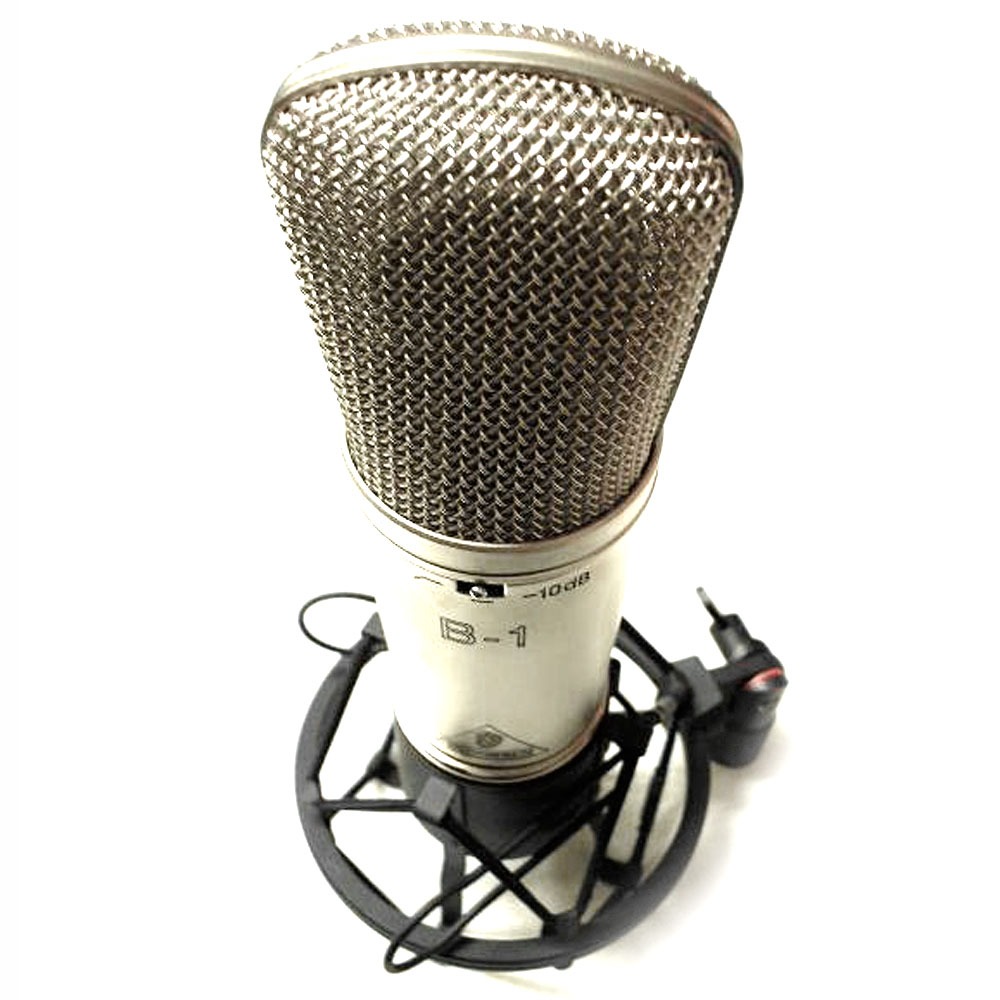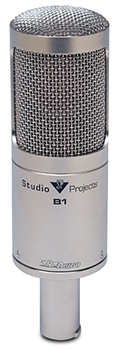
Behringer B-1
Large Diaphragm Condenser Mic
Buy from Amazon $75.10We receive a small kickback from our partners when you click through and purchase the great gear we recommend. Details
Best Budget Vocal Microphone
Behringer B-1
- Don Makoviney
- Last Updated: August 31, 2020
If you want a solid large diaphragm condenser microphone on a budget, with enough flexibility to record everything from vocals to acoustic instruments, the Behringer B-1 is the one to get.
Who Should Buy This?
For the producer on a budget that wants a professional sounding microphone for vocals, acoustic instruments, and just about anything, this is the microphone to get.
The price is right, the reviews are right on the money. This is a great starter mic that grows with you. For the singer songwriter, this mic will give you many years of valuable recording time. It works amazingly well for acoustic guitars and vocals.
I’ve used this mic for many years, and it is now my daughter’s primary vocal microphone. It is very quiet – no buzzing, hissing, or other noise usually associated with “budget” microphones in this category. It also captures natural acoustic sounds very well.
There are a handful of microphones in this category, all with unique features and varying degrees of “extra features.”
How We Picked What To Review
We found the best reviewed and best rated budget large diaphragm condenser microphones for the shortlist and combined it with our list of budget mics we own. Then we whittled the list down further to only include ones in the $100 range. Then, we asked a few local studios and engineers what they would recommend, which left us with the following list:
How We Reviewed
First we gathered up the specs, and checked our main sources for reviews. I’ve been really happy with my Behringer B1, but when I bought it years ago I didn’t really know what I was doing when I was recording. It was just cheap and sounded really nice. So if I was ever in the market for another budget mic in this category, would I get the same one again?
The answer (even after years of owning this thing); Yes yes yes.
I still find myself blown away with the clarity and tone that the B1 captures (even after having this thing for 5+ years!). I still get people asking me which microphone I use all the time because they’re just as impressed. I recommend the B1 to anyone who wants to know what they should buy to start recording. For 100 bucks, it’s a phenomenal vocal mic, but I’ve even used it on drums and guitars A LOT over the years and I am never disappointed with the outcome. I always end up coming back to it.
Another great thing about this microphone is that it has been around for so long. There are plenty of reviews online based on a decade or more of usage who also agree.
Let’s take a look:
Around The Web
On Amazon the Behringer B-1 has maintained five stars (out of five) for years. Here’s a snapshot of some reviews that echo my sentiment:
“Lots of Behringer products such as their instrument amplifiers are probably the last choice I’d make, but I’m really glad I tried their B-1 microphone. I recommend the B1 all the time.”
“Update-4/18/2013: Five years later, and I’m still getting excellent service and quality out of this mic. I’m now recording into a Tascam D-24, and get very sensitive response and smooth, warm tone from the B-1.”
“The self noise was almost non existent. Virtually no hiss, hum or anything else for that matter, just my baritone voice coming thru nice and smooth so much so that I had to sit there and admire the sound for a few minutes because I could actually hear the difference compared to the two other mics I had been using for the last several months. WOW! I LOVE this mic! And for less than $99…No Brainer.”
4.5 out of 5 stars on Zzounds
4.5 out of 5 stars on Sweetwater Sound
On the Gearslutz recording forum one reviewer noted:
“After a year went buy I had more money and started climbing the ladder, I wish I still had it [The Behringer B-1] now to compare it with some of my microphones. I’ll probably re-buy one of these one day. I’d say it’s the best $100 mic you can get.”
Graham Cochrane at The Recording Revolution recommends the Behringer B-1 all the time:
“Almost a decade later (and much money spent) I still come back to my beloved B-1. I’ve used it for vocals and acoustic guitars like crazy on the last 3 projects I produced.”
I personally use this mic and can attest to it’s low noise and great sound, which is why I heartily recommend it. If it broke, I would buy it again.
How Does It Compare To More Expensive Microphones?
Very well!
Check out this YouTube video. The Behringer B-1 ($99) is compared side-by-side with the Neumann U87AI ($3200) in a voice-over test:
Sure, the Neumann has a much richer low end, which is great for voiceover work. Do you think the $3100 price difference is worth it? Especially when some simple EQ’ing, or perhaps a decent preamp, could get you even closer? (No, it’s not.)
Imagine all the cool gear you could buy with that extra $3100!
Runner Up Choice
If I wanted to add another large diaphragm condenser mic I would seriously consider the Studio Projects B1. It is $20 more, but the reviews and recordings I have heard with it are quite astonishing.
Sound on Sound Magazine reviewed the Studio Projects B1 and said,
“However, one very pleasant surprise was the way this mic interpreted acoustic guitar. Most capacitor mics will render a fairly clean and natural-sounding recording of an acoustic guitar if correctly positioned, but this model added some flattering weight to the sound and seemed less critical of positioning. It also seemed to smooth out the rough edges without losing any detail — the top end comes over as open and detailed, but without being harsh or scratchy.”
Wrapping Up
The best thing you can do with your microphones is use them often. Whether you buy an expensive well-regarded microphone, or one of our budget choices above, getting to know the intricacies of a microphone is the surest way to get a good recording.
How do you do that? By spending time recording. Getting in your studio and RECORDING is worth more than any $1000 microphone. So, learn what your microphone sounds like directly in front of the sound hole of your guitar. Learn what it sounds like at the 12th fret. These are the things that make good recordings great – NOT the price or number of microphones in your arsenal.
Make sure you have a great pop filter and and vocal shield too.
The Behringer B-1 is our favorite budget condenser mic based on years of experience, consulting with sound engineers, as well as plenty of happy customers around the web.
Tell Me If There's A Deal For This
Best Budget Vocal Microphone
Behringer B-1

Important Specs
| Type | Single Diaphragm Condenser |
| Freq. Response | 20 Hz to 20 kHz |
| Phantom Powered | Yes |
| Accessories | carrying case, shock mount, and windscreen |
| more specs |
Synopsis:
If you want a solid large diaphragm condenser microphone on a budget, with enough flexibility to record everything from vocals to acoustic instruments, the Behringer B-1 is the one to get.

Also Great ...
Studio Projects B1 Vocal Condenser Mic Cardioid
Rich sound and less critical of mic placement make this a smart choice for adding solid acoustic recordings to your mix.
Sources
-
Chris Nunley, YouTube, 20130506
Microphone Shootout: Neumann TLM 103 VS Behringer B-1“Here is a microphone shootout between the Neumann TLM 103 and the Behringer B-1. These are both condenser microphones. The TLM 103 is over 1200 dollars while the Behringer B-1 is 99. Huge price difference. Although there is a slight difference in sound, It is up to you whether it is worth the price. You can definitely hear that the Neumann has a much better low end.”
-
Paul White, Sound on Sound Magazine, 20050601
Review: Studio Projects B1 Condenser MIcrophone“The B1 may seem like just another cheap Chinese mic, but it punches well above its league.”
-
Graham Cochrane, The Recording Revolution, 20091026
The Best $100 You Will Spend“Almost a decade later (and much money spent) I still come back to my beloved B-1. I’ve used it for vocals and acoustic guitars like crazy on the last 3 projects I produced.”
-
Forum User, Gearslutz.com, 20120317
Behringer B-1: Cheap and great.“After a year went buy I had more money and started climbing the ladder, I wish I still had it now to compare it with some of my microphones. I'll probably rebuy one of these one day. I'd say the best $100 mic you can get.”
-
Kevin Speranza, Amazon Reviews, 20120309
It's a wonderful thing...when you get more than you pay for...“The self noise was almost non existent. Virtually no hiss, hum or anything else for that matter, just my baritone voice coming thru nice and smooth so much so that I had to sit there and admire the sound for a few minutes because I could actually hear the difference compared to the two other mics I had been using for the last several months. WOW! I LOVE this mic! And for less than $99…No Brainer.”
Important Specs
| Type | Single Diaphragm Condenser |
| Freq. Response | 20 Hz to 20 kHz |
| Phantom Powered | Yes |
| Accessories | carrying case, shock mount, and windscreen |
| more specs |
Follow MSCGR
Talk To Us
Did we miss a recommendation? Is there something you'd like to see us review? Typos? Mistakes? If so, drop us a line.
